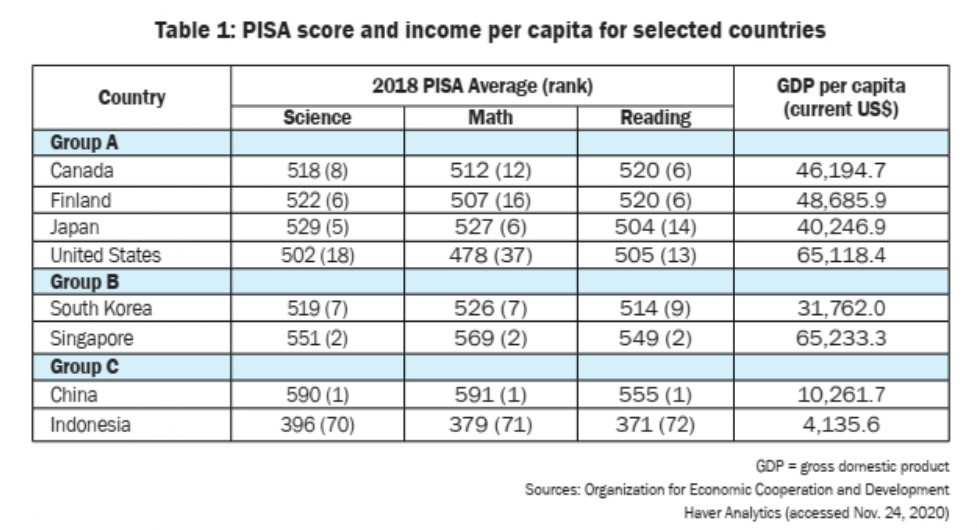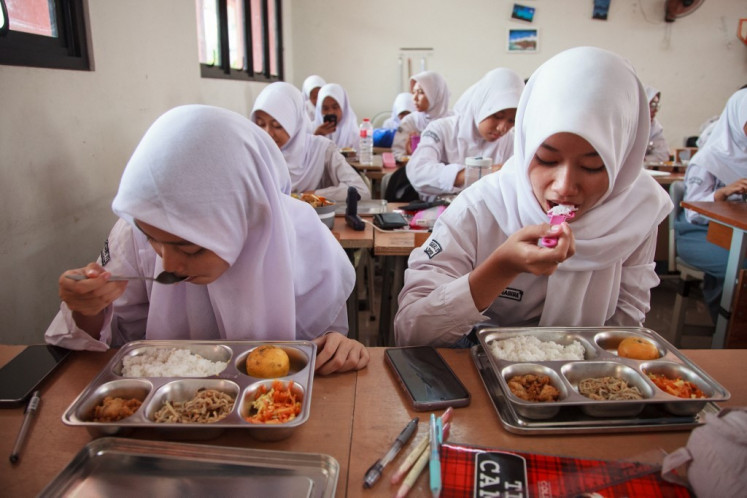Popular Reads
Top Results
Can't find what you're looking for?
View all search resultsPopular Reads
Top Results
Can't find what you're looking for?
View all search resultsHuman resource development: We are all in it together
The impact on economic growth is much higher if an education system focuses on improving cognitive skills similar to the OECD average and develops a critical mass of students with the top-end skills needed to become inventors.
Change text size
Gift Premium Articles
to Anyone
E
arly this year, after 15 years ranked as a lower-middle income country, Indonesia graduated to upper-middle income country status (UMIC). The World Bank classifies UMICs as countries with a gross national income per capita of US$4,045 to $12,535 and high-income countries (HIC) with incomes above $12,535.
The current government envisions Indonesia to reach HIC status by 2045, before the country’s centennial celebration. Learning from the few Asian countries already with HIC status such as South Korea and Singapore, as well as China which is soon to graduate to HIC status, one of the most critical elements is the quality of human resources—not just education, but the skills honed and the capacity to learn and relearn.
These countries became more dependent on the quality of their human resources as their incomes grew. Their sources of growth increasingly derived from innovation, continued productivity gains and the expansion of higher-skilled occupations in higher-end services and sophisticated manufacturing.
There are several ways of measuring human resource quality. But one of the most commonly used international indicators is the Programme for International Student Assessment (PISA) developed by the Organization for Economic Cooperation and Development (OECD). As shown in Table 1, South Korea, Singapore and China all rank very high on their PISA scores. China topped the PISA rankings in 2018, demonstrating its readiness to graduate to HIC status soon.
It is very encouraging to note that, in its second term, President Joko “Jokowi” Widodo’s government has put human resource development as its top priority. The 2021 budget, despite the huge spending to cope with the COVID-19 impact, includes large support for improving the quality of education, including programs that improve PISA scores, early childhood education, and the infrastructure needed to support online learning. These are all big steps in the right direction.
An Asian Development bank (ADB) study published in ADB’s Key Indicators for Asia and the Pacific 2015 found that the impact on economic growth is much higher if an education system focuses on improving cognitive skills similar to the OECD average and develops a critical mass of students with the top-end skills needed to become inventors. In contrast, strategies that simply increase years of schooling only provide a relatively low boost to growth.
Based on an analysis of 67 countries, the study showed that countries that produced students with better cognitive skills were those that (i) had developed a good system for collecting quality information, particularly on learning outcomes; (ii) have curricula that emphasize critical thinking and are matched to student capabilities; and (iii) invest in early childhood development.
Why are all of these important? An information system with good data collection on learning outcomes helps hold teachers and stakeholders accountable. In addition, it also helps design the evidence-based policies needed to continually improve education quality. The COVID-19 pandemic exposed how vulnerable the existing education system is. Post-pandemic, policies need to empower students by providing them better access to quality learning.
Good curricula improve student learning capabilities and help develop transferable labor market-relevant skills. It needs to match student learning capabilities; because when too hard or too easy, they may learn very little. Also, basic education curricula, especially at the secondary level, should increasingly focus on developing skills that are highly transferable, whether cognitive, noncognitive or technical.
As for early childhood development, James Heckman, the 2000 Nobel laureate for Economic Sciences, championed the need to start education as early as possible. The time from birth to age five is critical for shaping later productivity. It is during this period that the brain develops rapidly, building the foundations for the cognitive and character skills needed for success in school, one’s career and in life. Therefore, he believes investing in early childhood is a cost-effective way to promote economic growth. Often underappreciated, the role parents play at this stage is far bigger than teachers, as they spend much more time with young children.
Another important indicator of education quality is teacher quality. This has been widely studied, but basically the teacher leads student learning. In teaching, the law of the lid (leadership ability) applies. If the teacher’s grade is only 7, the teacher can only help students achieve a grade of 6 at best. If students want a grade higher than 6 or 7, they will need to find learning sources beyond the teacher. So, to help the student achieve a higher grade, we need more capable teachers as well.
For someone who grew up on a farm, I find a farming analogy very helpful in synthesizing the message above. A good harvest usually requires fertile land, good seeds and a skillful farmer. A defect in any one of them will result in a poor harvest.
The information system and the curriculum are like the fertile soil for the plants to grow. Early childhood development is like the place where parents can create superior and resilient seeds. And finally, teachers and parents are like the farmers, who look after the plants to make sure they bear plenty of fruits.
So, to consistently yield a good harvest from our education system, all of us—the government, teachers and parents—need to effectively be in it together.
***
The writer is the deputy director general of economic research and regional cooperation at the Asian Development Bank. The views expressed are his own.










